leave详细固定搭配用法
leave的六种宾补结构

leave的六种宾补结构Leave的六种宾补结构Leave是一个常用的动词,它可以用来表示离开某个地方或情况。
在句子中,leave可以带有宾补结构,用来进一步说明离开的方式、目的或结果。
本文将介绍leave的六种常见宾补结构,分别是leave sb. + adj., leave sb. + n., leave sb. + to do sth., leave sb. + v.-ing, leave sb. + adv. 和 leave sb. + prep. phrase。
一、leave sb. + adj.(使某人处于某种状态)这种结构表示离开后留下某人处于某种状态,常用于描绘情感或心理状态。
例如:1. I was deeply moved by the movie. It left me speechless.(那部电影让我深受感动,让我无言以对。
)2. The news of her promotion left me envious.(她晋升的消息让我羡慕不已。
)二、leave sb. + n.(使某人处于某种状态)这种结构表示离开后留下某人处于某种状态,常用于描述具体的情况或感受。
例如:1. The loud noise left me with a headache.(那嘈杂的声音让我头疼不已。
)2. The unexpected rainstorm left us in a mess.(突如其来的暴雨让我们一片混乱。
)三、leave sb. + to do sth.(让某人去做某事)这种结构表示离开时将某人交给他人或自己去做某事。
例如:1. My boss left me to handle the project on my own.(我的老板让我自己负责处理这个项目。
)2. She left her children to play in the park while she went shopping.(她让孩子们在公园里玩耍,自己去购物。
leave的用法及短语
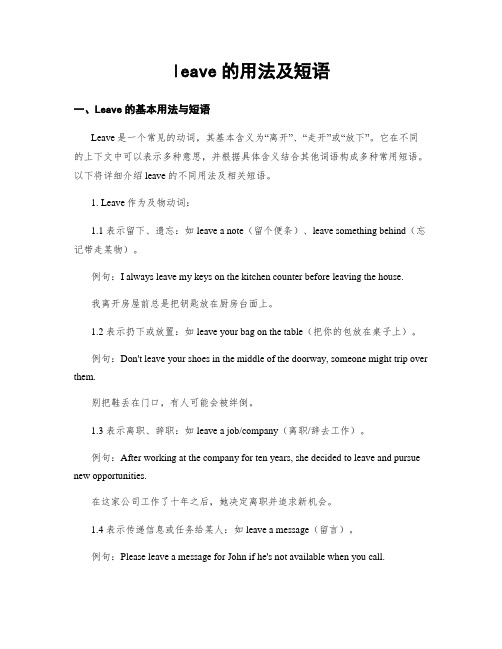
leave的用法及短语一、Leave的基本用法与短语Leave是一个常见的动词,其基本含义为“离开”、“走开”或“放下”。
它在不同的上下文中可以表示多种意思,并根据具体含义结合其他词语构成多种常用短语。
以下将详细介绍leave的不同用法及相关短语。
1. Leave作为及物动词:1.1 表示留下、遗忘:如leave a note(留个便条)、leave something behind(忘记带走某物)。
例句:I always leave my keys on the kitchen counter before leaving the house.我离开房屋前总是把钥匙放在厨房台面上。
1.2 表示扔下或放置:如leave your bag on the table(把你的包放在桌子上)。
例句:Don't leave your shoes in the middle of the doorway, someone might trip over them.别把鞋丢在门口,有人可能会被绊倒。
1.3 表示离职、辞职:如leave a job/company(离职/辞去工作)。
例句:After working at the company for ten years, she decided to leave and pursue new opportunities.在这家公司工作了十年之后,她决定离职并追求新机会。
1.4 表示传递信息或任务给某人:如leave a message(留言)。
例句:Please leave a message for John if he's not available when you call.如果约翰不在的话,请给他留个信息。
2. Leave作为不及物动词:2.1 表示离开某地、离去:如leave for work(去上班)、leave from the airport (从机场离开)。
leave句型结构
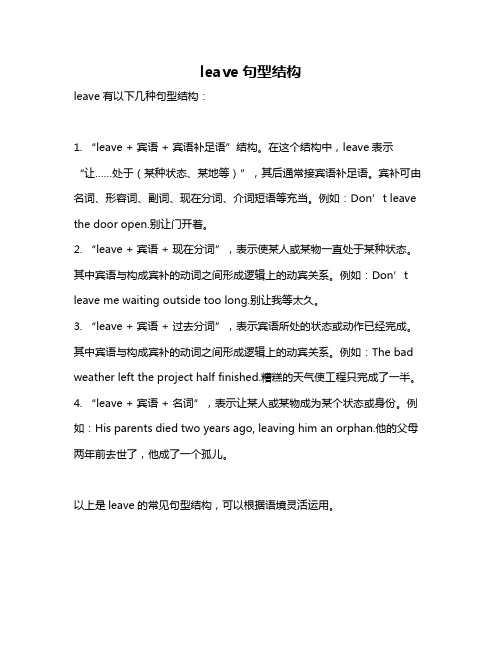
leave句型结构
leave有以下几种句型结构:
1. “leave + 宾语 + 宾语补足语”结构。
在这个结构中,leave表示“让……处于(某种状态、某地等)”,其后通常接宾语补足语。
宾补可由名词、形容词、副词、现在分词、介词短语等充当。
例如:Don’t leave the door open.别让门开着。
2. “leave + 宾语 + 现在分词”,表示使某人或某物一直处于某种状态。
其中宾语与构成宾补的动词之间形成逻辑上的动宾关系。
例如:Don’t leave me waiting outside too long.别让我等太久。
3. “leave + 宾语 + 过去分词”,表示宾语所处的状态或动作已经完成。
其中宾语与构成宾补的动词之间形成逻辑上的动宾关系。
例如:The bad weather left the project half finished.糟糕的天气使工程只完成了一半。
4. “leave + 宾语 + 名词”,表示让某人或某物成为某个状态或身份。
例如:His parents died two years ago, leaving him an orphan.他的父母两年前去世了,他成了一个孤儿。
以上是leave的常见句型结构,可以根据语境灵活运用。
leave 的用法
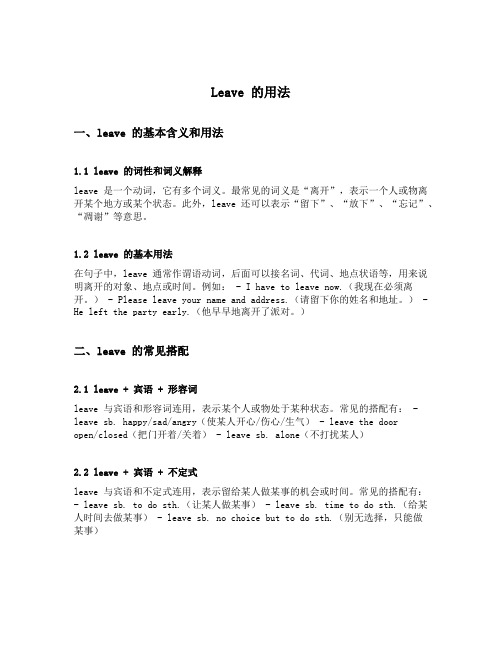
Leave 的用法一、leave 的基本含义和用法1.1 leave 的词性和词义解释leave 是一个动词,它有多个词义。
最常见的词义是“离开”,表示一个人或物离开某个地方或某个状态。
此外,leave 还可以表示“留下”、“放下”、“忘记”、“凋谢”等意思。
1.2 leave 的基本用法在句子中,leave 通常作谓语动词,后面可以接名词、代词、地点状语等,用来说明离开的对象、地点或时间。
例如: - I have to leave now.(我现在必须离开。
) - Please leave your name and address.(请留下你的姓名和地址。
) - He left the party early.(他早早地离开了派对。
)二、leave 的常见搭配2.1 leave + 宾语 + 形容词leave 与宾语和形容词连用,表示某个人或物处于某种状态。
常见的搭配有: - leave sb. happy/sad/angry(使某人开心/伤心/生气) - leave the dooropen/closed(把门开着/关着) - leave sb. alone(不打扰某人)2.2 leave + 宾语 + 不定式leave 与宾语和不定式连用,表示留给某人做某事的机会或时间。
常见的搭配有:- leave sb. to do sth.(让某人做某事) - leave sb. time to do sth.(给某人时间去做某事) - leave sb. no choice but to do sth.(别无选择,只能做某事)2.3 leave + 宾语 + 名词短语leave 与宾语和名词短语连用,表示留下某物。
常见的搭配有: - leave a message/note(留言/便条) - leave a tip(留小费) - leave a mark(留下痕迹)三、leave 的相关习惯用法和固定搭配3.1 leave it at thatleave it at that 是一个固定的短语,表示不再继续谈论或处理某个事情。
2012中考英语词语leave用法详解
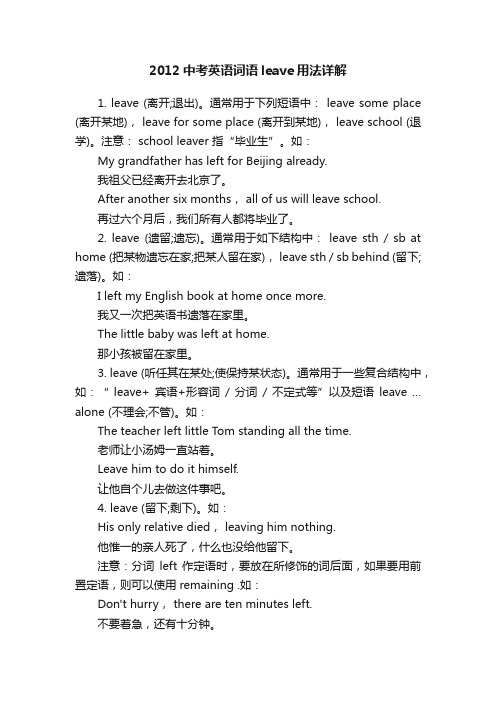
2012中考英语词语leave用法详解1. leave (离开;退出)。
通常用于下列短语中: leave some place (离开某地), leave for some place (离开到某地), leave school (退学)。
注意: school leaver 指“毕业生”。
如:My grandfather has left for Beijing already.我祖父已经离开去北京了。
After another six months, all of us will leave school.再过六个月后,我们所有人都将毕业了。
2. leave (遗留;遗忘)。
通常用于如下结构中:leave sth / sb at home (把某物遗忘在家;把某人留在家), leave sth / sb behind (留下;遗落)。
如:I left my English book at home once more.我又一次把英语书遗落在家里。
The little baby was left at home.那小孩被留在家里。
3. leave (听任其在某处;使保持某状态)。
通常用于一些复合结构中,如:“ leave+ 宾语+形容词/ 分词/ 不定式等”以及短语leave … alone (不理会;不管)。
如:The teacher left little Tom standing all the time.老师让小汤姆一直站着。
Leave him to do it himself.让他自个儿去做这件事吧。
4. leave (留下;剩下)。
如:His only relative died, leaving him nothing.他惟一的亲人死了,什么也没给他留下。
注意:分词left 作定语时,要放在所修饰的词后面,如果要用前置定语,则可以使用 remaining .如:Don't hurry, there are ten minutes left.不要着急,还有十分钟。
leave的用法和短语

leave的用法和短语一级标题:Leave的用法和短语二级标题1:Leave的基本解释和常见用法Leave是一个常用的动词,在不同语境下有不同的用法。
它可以作为动词,名词或者短语来使用。
本文将重点介绍leave作为动词时的用法和常见搭配。
作为一个及物动词,leave在最基本的意思上表示离开、遗留或使某物保持某种状态。
例如,“He left the room”意味着他离开了房间。
1. 离开某地或某人:当leave指离开某个特定地方或离开某个人时,通常会使用以下表达方式:- leave for + 地点:表示前往某处。
例如,“I will leave for London tomorrow.”- leave at + 时间:表示在某个特定时间离开。
例如,“He left at 8 o'clock in the morning.”- leave sb. behind:留下某人。
例如,“Don't leave me behind!”2. 遗忘、遺落(把东西丢在别处):当leave指忘记或丢失时,我们可以使用以下短语:- leave sth. behind:将物品遗忘在某处。
“She acci dentally left her keys behind at the office.”- leave sth. somewhere:将物品丢失在某处。
“I left my umbrella somewhere yesterday, and I can't find it now.”3. 剩下、保持某种状态:作为一个动态词,leave可以表示“剩下”或“保持某种状态”。
以下是一些常见的搭配方式:- leave sth. + 形容词:表示将某物保持在某种状态下。
“Please leave the d oor open.”- leave sb./sth. + 名词:指留给某个人或留有某个物品。
leave的用法和固定结构

leave的用法和固定结构一、Leave的基本含义Leave作为一个常用的动词,有多重含义和用法。
它可以表示离开某个地方或者停止做某个事情。
在不同的语境中,我们需要根据具体情况来使用合适的固定结构。
二、离开某个地点1. Leave + 地点:表示离开某个地点,常与副词here, there相连。
例如:"I'm leaving here tomorrow."(我明天离开这里。
)2. Leave for + 目的地:表示前往某个目的地。
例如:"She left for Paris this morning."(她今天早上去巴黎了。
)3. Leave + 地点 + to do sth.:表示留下去做某事。
例如:"He left the office to pick up his son from school."(他离开办公室去接儿子放学。
)4. Leave + 地点 + behind:表示把某人/某物留在某处。
例如:"Don't leave your bag behind!" (别忘了带走你的包!)三、停止做某件事1. Leave off + 动词/动名词:表示停止做某件事情。
例如:"Let's leave off working and take a break."(让我们停下工作,休息一下吧。
)2. Leave out + 某人/某物:表示忽略、漏掉。
例如:"He left out an important detail in his presentation."(在他的演讲中忽略了一个重要的细节。
)四、Leave固定结构1. Leave it to + 人:表示把决策或处理交给某人,表示信任和让步。
例如:"I'll leave it to you to decide where we should go for dinner."(晚餐去哪里我交给你决定。
leave用法及固定搭配
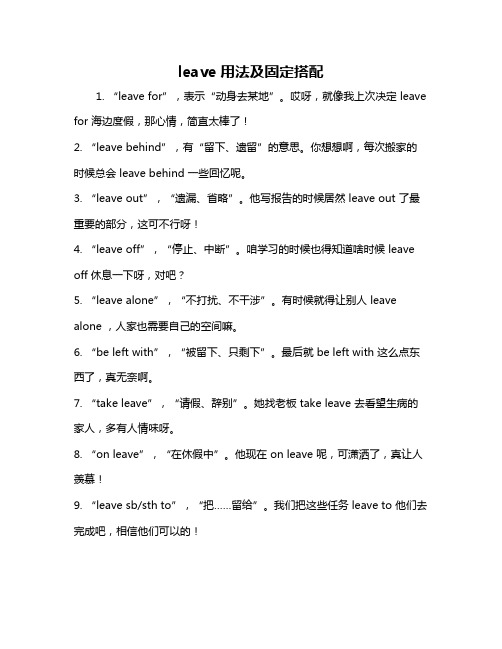
leave用法及固定搭配
1. “leave for”,表示“动身去某地”。
哎呀,就像我上次决定 leave for 海边度假,那心情,简直太棒了!
2. “leave behind”,有“留下、遗留”的意思。
你想想啊,每次搬家的时候总会 leave behind 一些回忆呢。
3. “leave out”,“遗漏、省略”。
他写报告的时候居然 leave out 了最重要的部分,这可不行呀!
4. “leave off”,“停止、中断”。
咱学习的时候也得知道啥时候 leave off 休息一下呀,对吧?
5. “leave alone”,“不打扰、不干涉”。
有时候就得让别人 leave alone ,人家也需要自己的空间嘛。
6. “be left with”,“被留下、只剩下”。
最后就 be left with 这么点东西了,真无奈啊。
7. “take leave”,“请假、辞别”。
她找老板 take leave 去看望生病的家人,多有人情味呀。
8. “on leave”,“在休假中”。
他现在 on leave 呢,可潇洒了,真让人羡慕!
9. “leave sb/sth to”,“把……留给”。
我们把这些任务 leave to 他们去完成吧,相信他们可以的!
我的观点结论就是:这些 leave 的用法及固定搭配都超级实用呀,大家一定要好好掌握哦!。
leave短语搭配
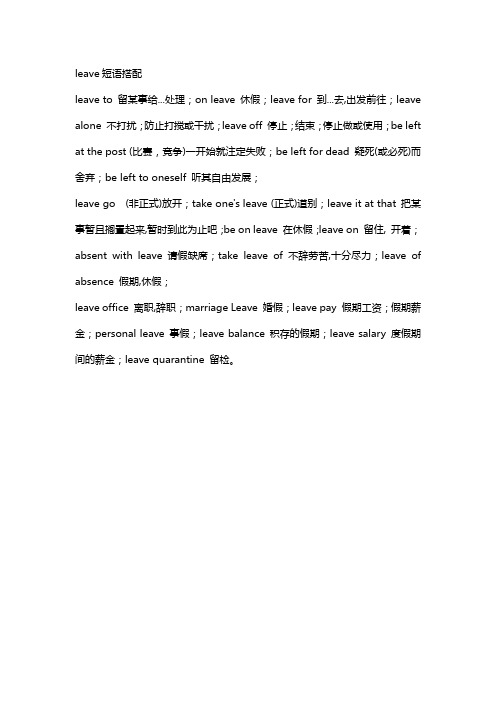
leave短语搭配
leave to 留某事给...处理;on leave 休假;leave for 到...去,出发前往;leave alone 不打扰;防止打搅或干扰;leave off 停止;结束;停止做或使用;be left at the post (比赛,竞争)一开始就注定失败;be left for dead 疑死(或必死)而舍弃;be left to oneself 听其自由发展;
leave go (非正式)放开;take one's leave (正式)道别;leave it at that 把某事暂且搁置起来,暂时到此为止吧;be on leave 在休假;leave on 留住, 开着;absent with leave 请假缺席;take leave of 不辞劳苦,十分尽力;leave of absence 假期,休假;
leave office 离职,辞职;marriage Leave 婚假;leave pay 假期工资;假期薪金;personal leave 事假;leave balance 积存的假期;leave salary 度假期间的薪金;leave quarantine 留检。
leave宾补的几种情况

leave宾补的几种情况一、以leave宾补的情况一:leave + 名词宾语leave可以用来表示某人离开某地或将某物留在某处。
在这种情况下,leave后面可以跟名词宾语,表示被离开的地点或被留下的物品。
例如:1. He left his bag on the bus.(他把包忘在公交车上了。
)2. Don't forget to leave a note on the table.(别忘了在桌子上留个便条。
)3. She left her phone at home.(她把手机落在家里了。
)二、以leave宾补的情况二:leave + 宾补(动词不定式)leave还可以与动词不定式构成宾补,表示某人离开某地或将某事交给他人去做。
例如:1. He left to catch the train.(他离开去赶火车了。
)2. Don't leave your homework to the last minute.(别把作业拖到最后一刻。
)3. She left me to deal with the problem on my own.(她让我自己处理这个问题。
)三、以leave宾补的情况三:leave + 宾补(形容词)leave还可以与形容词构成宾补,表示某人离开后给人留下某种感觉或状态。
例如:1. The movie left me feeling inspired.(这部电影让我感到鼓舞。
)2. His words left her speechless.(他的话让她无言以对。
)3. The news left us all shocked.(这个消息让我们都感到震惊。
)四、以leave宾补的情况四:leave + 宾补(副词)leave还可以与副词构成宾补,表示某人离开后以某种方式或状态。
例如:1. He left quietly, without saying a word.(他悄悄地离开了,一言不发。
leave的用法和固定搭配

leave的用法和固定搭配一、Leave的基本用法Leave是一个常见的英语动词,用于表示离开或者放弃某个地方、职位或状态。
它可以单独使用,也可以和其他词组成固定搭配。
接下来将介绍leave的基本用法以及其固定搭配。
1. Leave作为不及物动词指代离开某地或结束某项活动时,它常与介词from连用,表示"从......离开"。
例如:- He left from the office early yesterday.他昨天早退了办公室。
2. Leave也可以表示把某物留在某处,常与名词和介词for连用。
例如:- She left a note for me on the table.她在桌上给我留了一个便条。
二、Leave的固定搭配1. Leave sb./sth. alone: 不打扰/不碰某人或者某物。
该短语中alone作为副词,修饰leave,意思是让对方保持安宁或者对某人不加干涉。
例如:- Please leave me alone, I need some quiet time.请别打扰我,我需要一些安静的时间。
2. Leave sth. behind: 忘记带走当我们在外出时经常会忘记带走一些东西,这时就可以使用这个短语。
例如:- I left my umbrella behind in the restaurant.我在餐馆忘记带伞了。
3. Leave sth. for sb.: 为某人留下某物当我们不在家时,可以留下一些消息或者事物给在家的人。
例如:- I left some dinner for you in the fridge.我在冰箱里给你留了一些晚餐。
4. Leave sth. to chance: 随机对待,不做特定安排有时候我们可能会决定不做任何特定的安排或者计划,而是让事情自然发展。
例如:- Instead of making a schedule, let's just leave it to chance and see what happens.我们不制定计划,就随它自然发展吧,看看会发生什么。
leave的用法和固定搭配

leave的用法和固定搭配
1.leave+地点离开某地
leave the room 离开房间leave the library 离开图书馆
2.leave for +目的地动身去某地
leave for the station 动身去车站
I am leaving for Hongkong tomorrow. 我明天去香港。
3.leave A for B 离开A去往B
Tom is leaving Qingdao for Shanghai. 汤姆要离开青岛去上海。
4.“leave sth./sb. + 时间”表示“把某事搁置到某时”
He always leaves the things till next day.
他总是把事情留到第二天。
5. v. “让…处于…(状态)
leave me alone. 让我静静。
leave the window open 让窗户开着
6. n. 假期、准假
ask for a leave 请假
7.leave a message for sb. 给某人留口信Can I leave a message for him? 我可以给他留口信吗?
8.leave sth./sb. + 地点”“把某人/某物留在或者落在某地”
I left my pen in the classroom. 我把钢笔落在教室了。
He left his children in the supermarket
yesterday. 昨天他把孩子们落在超市了。
leave扩充知识用法讲解修改版

【关于left的原形动词leave扩充知识用法讲解】【1】主语+leaveIt's time for us to leave.我们现在该走了。
She apologized and left.她表示了歉意就走了。
When we got there the train had left.我们到那儿时,火车已经开走了。
【2】主语+leave+名词/代词Our ship leaves port tonight.我们的船今晚出港。
For how long can we leave the steamer at the next port?船在下个港口停泊时,我们可以离船多久?This is the first glass of whisky I have had since I left Paris.这是我离开巴黎以来喝的第一杯威士忌。
【3】主语+leave+间接宾语+直接宾语He left his sister 300 pounds.他给妹妹留下300英镑。
We have left him enough food.我们给他留下了足够的食物。
His father left him nothing when he died.他父亲去世时什么也没有给他留下。
In his will, my uncle has left me all his property.我的叔父在遗嘱里已把他的全部财产留给了我。
Leave him the book before you go.你走之前把这本书交给他。
主语+be ~ed+主语补足语+其它She was left a big fortune by her husband.她丈夫给她留下一大笔遗产。
【4】主语+leave+直接宾语+to+间接宾语This letter needs answering. Can I leave it to you?这封信需要答复,这事交给你办,好吗?Leave him to his father, he'll deal with him.让他父亲去收拾他吧!He left the dictionary to me.他把那本词典给了我。
leave的用法及固定搭配
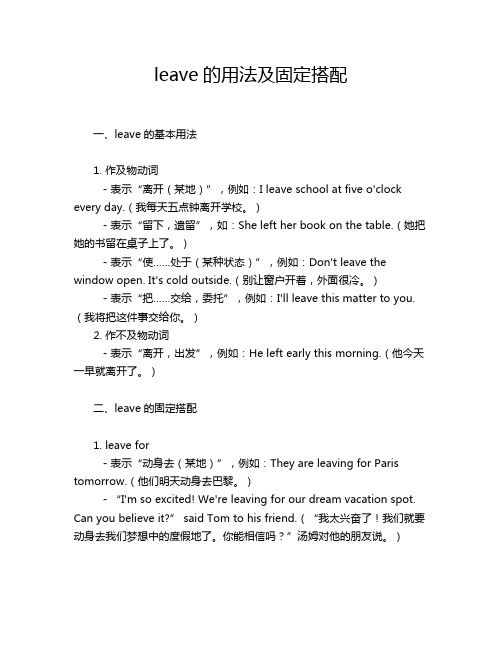
leave的用法及固定搭配一、leave的基本用法1. 作及物动词- 表示“离开(某地)”,例如:I leave school at five o'clock every day.(我每天五点钟离开学校。
)- 表示“留下,遗留”,如:She left her book on the table.(她把她的书留在桌子上了。
)- 表示“使……处于(某种状态)”,例如:Don't leave the window open. It's cold outside.(别让窗户开着,外面很冷。
) - 表示“把……交给,委托”,例如:I'll leave this matter to you.(我将把这件事交给你。
)2. 作不及物动词- 表示“离开,出发”,例如:He left early this morning.(他今天一早就离开了。
)二、leave的固定搭配1. leave for- 表示“动身去(某地)”,例如:They are leaving for Paris tomorrow.(他们明天动身去巴黎。
)- “I'm so excited! We're leaving for our dream vacation spot. Can you believe it?” said Tom to his friend.(“我太兴奋了!我们就要动身去我们梦想中的度假地了。
你能相信吗?”汤姆对他的朋友说。
)- “When are you leaving for your new job in that big city?” asked Jane. “Next week,” replied Mark.(“你什么时候动身去那个大城市开始你的新工作?”简问道。
“下周。
”马克回答。
)2. leave behind- 表示“留下,遗留;把……抛在后面”,例如:Don't leave behind your keys when you go out.(你出去的时候别落下钥匙。
leave某地的类似用法
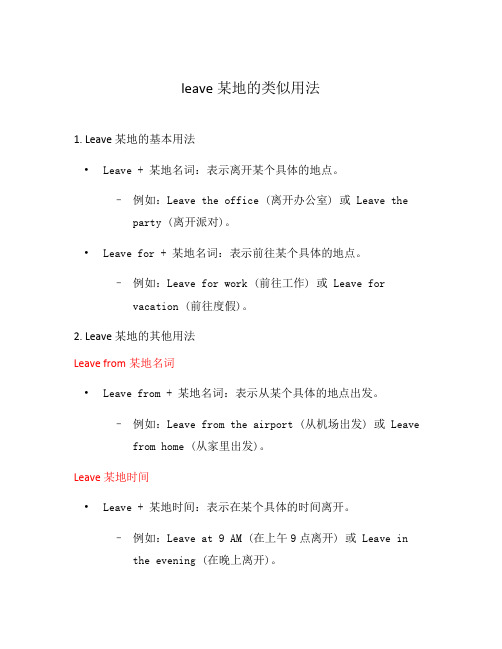
leave某地的类似用法1. Leave某地的基本用法•Leave + 某地名词:表示离开某个具体的地点。
–例如:Leave the office (离开办公室) 或 Leave the party (离开派对)。
•Leave for + 某地名词:表示前往某个具体的地点。
–例如:Leave for work (前往工作) 或 Leave forvacation (前往度假)。
2. Leave某地的其他用法Leave from某地名词•Leave from + 某地名词:表示从某个具体的地点出发。
–例如:Leave from the airport (从机场出发) 或 Leave from home (从家里出发)。
Leave某地时间•Leave + 某地时间:表示在某个具体的时间离开。
–例如:Leave at 9 AM (在上午9点离开) 或 Leave in the evening (在晚上离开)。
Leave某地原因•Leave + 某地原因:表示因为某个具体的原因离开。
–例如:Leave for personal reasons (因个人原因离开) 或 Leave due to illness (因病情离开)。
Leave某地方式•Leave by + 交通工具:表示通过某种交通工具离开。
–例如:Leave by car (开车离开) 或 Leave by train (乘火车离开)。
3. Leave某地的注意事项•确保语境准确:根据具体语境选择正确的用法。
•注意搭配词汇:根据需要搭配适当的名词、时间、原因或交通工具。
•灵活运用:根据语境和需要,可以结合其他动词、介词或副词进行表达。
以上是关于”leave某地的类似用法”的一些列举和详细讲解,希望对你有帮助。
请根据具体情况合理运用,并注意语境和搭配的准确性。
4. Leave某地的衍生用法Leave without某物•Leave without + 某物:表示离开时没有带走某物。
leave的用法
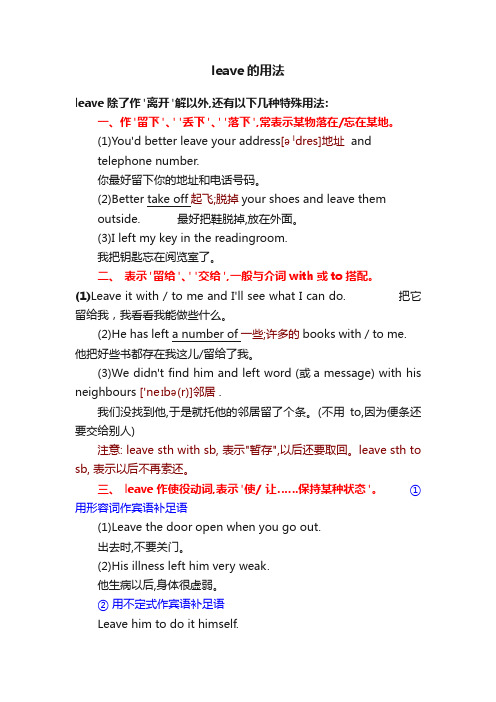
leave的用法leave除了作"离开"解以外,还有以下几种特殊用法: 一、作"留下"、"丢下"、"落下",常表示某物落在/忘在某地。
(1)You'd better leave your address[əˈdres]地址 andtelephone number. 你最好留下你的地址和电话号码。
(2)Better take off起飞;脱掉your shoes and leave themoutside. 最好把鞋脱掉,放在外面。
(3)I left my key in the readingroom. 我把钥匙忘在阅览室了。
二、表示"留给"、"交给",一般与介词with或to搭配。
(1)Leave it with / to me and I'll see what I can do. 把它留给我,我看看我能做些什么。
(2)He has left a number of一些;许多的books with / to me. 他把好些书都存在我这儿/留给了我。
(3)We didn't find him and left word (或a message) with his neighbours ['neɪbə(r)]邻居 . 我们没找到他,于是就托他的邻居留了个条。
(不用to,因为便条还要交给别人) 注意: leave sth with sb, 表示"暂存",以后还要取回。
leave sth to sb, 表示以后不再索还。
三、 leave作使役动词,表示"使/ 让……保持某种状态"。
①用形容词作宾语补足语 (1)Leave the door open when you go out. 出去时,不要关门。
leave的用法
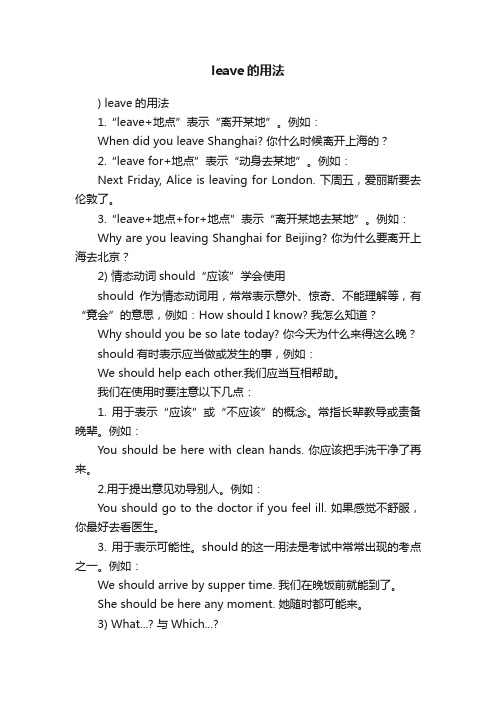
leave的用法) leave的用法1.“leave+地点”表示“离开某地”。
例如:When did you leave Shanghai? 你什么时候离开上海的?2.“leave for+地点”表示“动身去某地”。
例如:Next Friday, Alice is leaving for London. 下周五,爱丽斯要去伦敦了。
3.“leave+地点+for+地点”表示“离开某地去某地”。
例如:Why are you leaving Shanghai for Beijing? 你为什么要离开上海去北京?2) 情态动词should“应该”学会使用should作为情态动词用,常常表示意外、惊奇、不能理解等,有“竟会”的意思,例如:How should I know? 我怎么知道?Why should you be so late today? 你今天为什么来得这么晚?should有时表示应当做或发生的事,例如:We should help each other.我们应当互相帮助。
我们在使用时要注意以下几点:1. 用于表示“应该”或“不应该”的概念。
常指长辈教导或责备晚辈。
例如:You should be here with clean hands. 你应该把手洗干净了再来。
2.用于提出意见劝导别人。
例如:You should go to the doctor if you feel ill. 如果感觉不舒服,你最好去看医生。
3. 用于表示可能性。
should的这一用法是考试中常常出现的考点之一。
例如:We should arrive by supper time. 我们在晚饭前就能到了。
She should be here any moment. 她随时都可能来。
3) What...? 与Which...?1. what 与which 都是疑问代词,都可以指人或事物,但是what 仅用来询问职业。
(完整版)leave+宾语+宾补的用法

“leave+宾语+宾补”(即leave复合结构)的用法总结Leave+宾语+宾语补足语,其中宾语补足语这一成分可以由过去分词、现在分词、形容词、副词、介词的复合结构等来充当,意思是”使.....处于…..状态;听任;让”现分述如下:1.由过去分词来充当宾语补足语:leave sth/sb done,常用来表示宾语所处的状态或表示动作已经完成。
(宾语和宾补被动关系)(1)He got up slowly, leaving the lunch unfinished.(2)Did you leave the doors and windows firmly fastened?(3)I can't leave such an important matter undone/unfinished. 我不能让这样一件重要的事半途而废。
The moving story left him unmoved. 他对这个令人激动的故事竟然无动于衷。
2.由现在分词来充当宾语补足语:leave sb/sth doing,常用来表示使某人或某物一直做某事(宾语和宾补被动关系).(1)Don’t leave her waiting outside in the rain.(2)They went off together and left me sitting there.(3)We left him painting the gate.△可用于被动语态:The papers were left lying around.3.由形容词来充当宾语补足语:(1)You’d better leav e the drawing-room door open.(2)His illness has left him weak.△可用于被动语态:The window was left open.4.由副词作宾语补足语(1)What has left him away for so long?什么事使他离开了这么长时间?(2)We can’t leave the light on when leaving.5. 由介词的复合结构充当宾语补足语:(1)Leave him in peace!(2)His illness left him with a weak heart.(3)You’ve left her name off the list.(4)This matter left her without a way of hope. 这件事使她没有一丝一毫的希望。
- 1、下载文档前请自行甄别文档内容的完整性,平台不提供额外的编辑、内容补充、找答案等附加服务。
- 2、"仅部分预览"的文档,不可在线预览部分如存在完整性等问题,可反馈申请退款(可完整预览的文档不适用该条件!)。
- 3、如文档侵犯您的权益,请联系客服反馈,我们会尽快为您处理(人工客服工作时间:9:00-18:30)。
【13】leave sth about(1)乱丢/乱放某物He is apt to leave things about.他总喜欢把东西到处乱放。
(2) 把…随便乱放Don't leave your things about. 别把东西到处乱扔。
【14】leave sth aside搁置/不考虑某物/某事Let's leave the matter aside for a moment.我们把这件事搁一会儿再说。
【15】leave sth behind(1)忘带/留下/丢弃某事Don't leave me behind. 不要把我忘了。
He left his wife and children behind. 他抛下了妻子儿女。
主语+谓语+be+left behindThe luggage has been left behind.忘了带行李。
In their withdrawal, much of the heavy equipment had to be left behind. 在撤退时,他们不得不丢弃许多重型装备。
(2)使某人落后;把某人丢在后面leave sb/sth behindThe young athlete soon left the others far behind.那位年轻运动员很快就把其他选手抛在后面。
主语+谓语+be left behindHe was left behind in the race.他赛跑时落在后面。
If you don't study hard, you'll be left behind.你要是不努力学习,就会落在别人后面。
【16】leave for +地点名词(1)出发去(某地) 去某地/前往某地We're leaving for Rome next week.我们下星期要到罗马去。
The newly married couple are leaving for their honeymoon.这对新婚夫妇将动身外出度蜜月。
(2)leave A for B 离开A地方前往B地方She left Beijing for New York last year.她去年离开北京去了纽约。
(3)离开(某人)以同(他人)生活在一起;离开(某职位)以寻求leave sb/sth for sb/sth He left his wife for a worthless actress.他离开了妻子,同一位不值一提的女演员生活在一起。
The director is thinking of leaving the firm for a better position elsewhere.经理正在考虑离开这个公司,到其他地方找个更好的职位。
He left medicine for the law.他离开医学界而转入法学界。
【17】leave sb holding the bag/sack让某人背黑锅lThey all ran off and left me holding the bag.他们全都逃了,留下我一个人背黑锅。
【18】leave sth in 让…留下They have left those words in after all.他们毕竟还是保留了那些话。
The editor finally agreed to leave the paragraph in.编辑最后同意把那一段保留下来。
【19】leave it at that 行了,够了,到此为止I think I've given you a strong enough warning;we'll leave it at that for the moment. 我想我给你的警告也够厉害的了,现在暂时就不说了。
Let's leave it at that;we've worked hard enough today.我们就到这儿吧,今天也够辛苦的了。
【20】leave nothing/much to be done(1)leave nothing to be done十分完美/令人满意The work leaves nothing to be desired. 这项工作十分完美。
(2)leave much to be done 不十分完美/不令人满意What we've done still leaves much to be desired.我们的工作还有很多不足之处。
This hotel leaves much to be desired.这个旅馆不能令人满意【21】leave off(1)停止(做)某事,戒掉某事Has the rain left off yet?雨停了吗?Let's leave off here for lunch.吃饭了,就到此为止吧。
I think we should leave off now and have some coffee.我想现在我们该休息一下,喝点咖啡了。
(2)leave sth ⇔ off 脱掉某物Do not leave off your overcoat, it is cold.不要脱大衣,天气很冷。
We left off work earlier than usual today.今天,我们比平时下班早。
用于be ~ed 结构Cooling pumps were left off for more than an hour.冷却泵关了一个多小时。
(3)leave off v-ing停止一直那样做某事Leave off doing that, will you?别那样干了,好吗?Please leave off biting your nails.请不要再咬指甲。
Leave off teasing that boy.不要再逗那个男孩了。
Leave off interrupting me whenever I'm talking!无论我什么时候说话,不要打断我!It is time to leave off talking and to start acting.现在该停止讨论,开始行动了。
They leave off quarrelling to sleep.他们停止了争吵,然后就去睡觉了。
【22】leave on(1)让…留在原处Leave the cloth on,I want to lay the table for supper.不要取下台布,我要摆桌子吃晚饭了。
(2)让(火)燃着,让…开着allow to remain alight;be burningDon't leave the light on when you go out.出去时,请关灯。
I wish you wouldn't leave the air-conditioner on when you go out. 希望你出去时,别让空调开着。
【23】leave out遗漏,省略,删去;未顾及,忽略某物In copying this document, be careful not to leave out any word. 抄写这份文件时,当心不要漏掉任何词。
I notice that the advertisement leaves out the price of the product.我注意到广告没有提到产品的价格。
If you leave your bicycle out at night, it'll soon have trouble with rust.如果你晚上把自行车放在外面,车很快就会生锈的。
用于be ~ed 结构Not a comma was left out.一个逗号也没漏掉。
Nothing of value is left out.没有删掉任何有价值的东西。
Nobody speaks to him;he is always left out.没人跟他讲话,他总是被冷落。
Please complete this cheque properly;the date has been left out.请把这张支票好好填写完整,你把日期漏填了。
【24】leave sth over 留下/剩下某物(1)留下/剩下/剩余某物No food has been left over after the meal.饭后没有剩下什么。
(2)延后/推迟;(暂时搁置)留待以后处理某物/某事postpone;leave to be dealt with at a later dateLet's leave the meeting over till next month.我们把会议推迟到下月吧。
We'll leave the meat over for tomorrow.我们要把肉留到明天吃。
◇用于be ~ed 结构That matter can be left over until the committee meets next month.此事可延至下周委员会开会时再进行处理。
He thought the matter might be left over for the present.他认为这事眼下也许会缓一缓。
【25】leave sth up to sb 把某事交由某人处理Leave it up to me,I'll see to it.留给我吧,我会负责的。
用于be ~ed 结构At some colleges, the amount of work you will do is left entirely up to you. 在有些大学里,做多少功课完全由你自己来决定。
【26】leave with(1)将某人/某事留给某人照管leave sb/sth with sbMary left the children with her mother while she went on holiday.玛丽度假时把孩子留给母亲照管。
Leaving the baby with me, he went to join the Army.他把孩子托付给我就参军去了。
You can leave a message with his secretary .你可以留个条交给他的秘书。
Leave the parcel with me,I'll see that it gets delivered.把包裹交给我,我负责寄出去。
